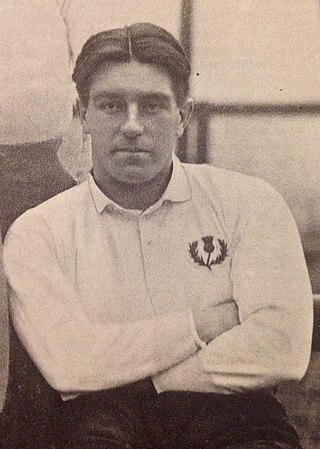
Ronald 'Ronnie' William Poulton was an English rugby union footballer, who captained England. He was killed in the First World War during the Second Battle of Ypres.

Jack Bancroft, born John Bancroft, was a Welsh cricketer, and rugby union international. He was a right-handed batsman and a wicket-keeper who played for Glamorgan. Bancroft also played rugby for Swansea RFC. He was born and died in Swansea.

Dicky Owen was a Welsh international scrum-half who played club rugby for Swansea RFC Owen is seen as one of the greatest Welsh scrum-halves and won 35 caps for Wales between 1901 and 1912, a record that was unbeaten until 1955 when Ken Jones surpassed him.

John Lewis Williams was a Welsh international wing who played club rugby for Cardiff Rugby Football Club. A three times Triple Crown winner, out of seventeen appearances for Wales he was on the losing side only twice.

William Purdon Geen was a rugby union wing and centre, who represented Wales, and played club rugby for Oxford University and Newport and county rugby for Monmouthshire. He was also invited to play for the Barbarians on several occasions. Geen unsuccessfully trialled for England in 1910, but was selected and played for Wales on three occasions in the 1912–1913 season. Injury prevented him from playing more internationals, and his service in the First World War put an end to his career.

Louis Augustus Phillips was a Welsh rugby player, who played half-back for Newport RFC, and won four caps for Wales. He was also a talented amateur golfer.

Thomas Kelly (1882–1959) was a rugby union international who represented England from 1906 to 1908. He also captained his country to a 19–0 victory over France at the Stade Colombes in Paris on 1 January 1908.
Jimmy Ross was a Scotland international rugby union player.

Lieutenant-Commander John Skinner Wilson was a Trinidad-born rugby player, who represented Scotland, United Services RFC and London Scottish FC. He enrolled in the Royal Navy in 1898. He was killed in World War I in the Battle of Jutland, serving as Lieutenant-Commander aboard HMS Indefatigable. He is remembered on panel 10 at the Plymouth Naval Memorial.

Walter Michael "Mike" Dickson was a rugby union player, who represented Scotland, Blackheath and Oxford. He was killed in World War I.

William "Willie" Middleton Wallace was a rugby union player. He played fullback for Cambridge University RFC and was capped for Scotland in 1913–14.

Pierre Guillemin was a French rugby union player, who represented France, Paris and Racing Club de France (RCF).
Harry Alexander was a rugby union international who represented England from 1900 to 1902, and was captain for one match, against Wales.
Robert Francis Williams was a Welsh international rugby union player. At club level he played for Canton RFC, Cardiff RFC and the Barbarians, and was selected on four occasions for Wales.

Arthur "Mud" James Dingle was a rugby union centre and wing, who won three caps for England, and played for County Durham, Hartlepool Rovers and Oxford University.
Douglas "Dan'l" Lambert was an English rugby union footballer for Harlequins, England, and the Barbarians. He won 7 caps for England between 1907 and 1911, notably scoring 5 tries on debut against France, and 22 points in another match against France. Lambert was all round sportsman: he was a scratch golfer, played football (soccer) for Corinthian Casuals, and kept wicket (cricket) for Hertforshire. He was killed in action at the Battle of Loos on 13 October 1915.

Francis Nathaniel Tarr was an English international rugby union player. He played centre for the Leicester Tigers and, between 1909 and 1913, won four caps for England, scoring two tries. He also earned three Blues while reading law at Oxford.

Henry "Norkey" Dewar was a New Zealand rugby union forward, who played for the All Blacks, and represented Taranaki and Wellington provinces.
Vincent McNamara was a rugby union player who represented Ireland. He died at Suvla Bay, Gallipoli, Ottoman Turkey, during World War I.
James Robertson was a Scottish rugby union international who represented Scotland in the 1908 Home Nations Championship.













